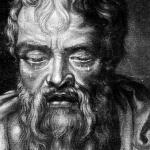 I was chatting with a social media acquaintance, someone I hope becomes a friend, who claimed to know this was not the best world that could be. He believed that I, a Christian, must believe that it is the best possible world. That is true: it is.
I was chatting with a social media acquaintance, someone I hope becomes a friend, who claimed to know this was not the best world that could be. He believed that I, a Christian, must believe that it is the best possible world. That is true: it is.
Yet the cosmos as we know it is not the best of all conceivable worlds.
Of course it is not.
We have chosen poorly often. Freely humankind decided we have the right to do as we will and I (at least) have chosen badly. If I could start my adult life over, I would.
So why create a world with free will beings?
God is very good and beautiful. He is love by nature and in the superabundance of love He created. When God was alone, “before” creation, then all was well. God loves God as God should! Yet when other beings were created, then consent became vital. God loved, but God’s overwhelming goodness was a difficulty.
God gave free will, because God was good. Consent came with love in the case of the beings God created. We could, all of us, angels, men, and every other sentient being (if there are any other) choose to say “yes” or “no” to God. Mary is the great example saying to God let it be done unto me according to your word.
Every choice we make, every single choice, has nearly endless repercussions and our choices all interact with each other and with the cosmos. The free choices of every being with free will interact: Moses, Lucifer, Mary, Judas, Peter, Herod, Damaris. We all live in a cosmos with a good God, free will, and the implications of our choices.
Mayhap the cosmos should be better than the cosmos is. Perhaps we know or could imagine less evil than we see: just not this one death in just this way. Yet this is unknowable because all the interlocking decisions and all the implications are (by nature) vast. We can imagine not this one thing, but cannot know the implications and implications of the implications . . .
When someone says the world could be better, then she is right: it could have been. When she says, the world could have had free will and be better, then she says what no man can know.
And, of course, this works the other way: we cannot see the world and know that it is the best of all possible worlds. Beauty exists, but so does ugliness. Couldn’t one bad thing have been prevented? Just looking at the world: we cannot know.
So why do I postulate that this is the best of all possible worlds despite my own faults?
Like Job, not because of the world, but because of God.
5 My ears had heard of you
but now my eyes have seen you.
God’s nature, power, and knowledge, known apart from just staring at the details that I know (so limited!) of history, suggest that if God who could make things different does not, then it must be better so. The nature of God, knowing God, is my hope for a good cosmos, not history. History can cut either way: curving toward justice or a pit of despair.
We cannot be utterly vile, because evil would destroy all existence. We may not be the best we could be if our only gaze is on what we know. When we look to the nature of God, reason gives us hope.













